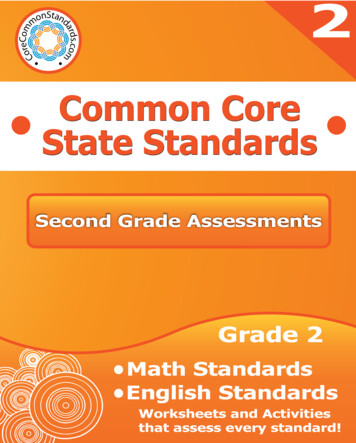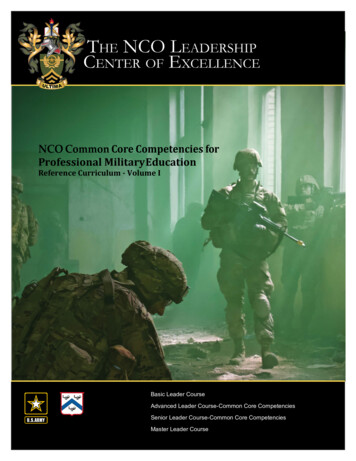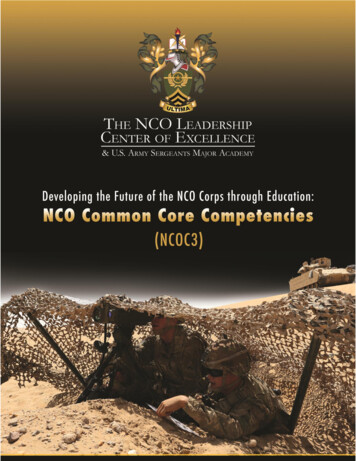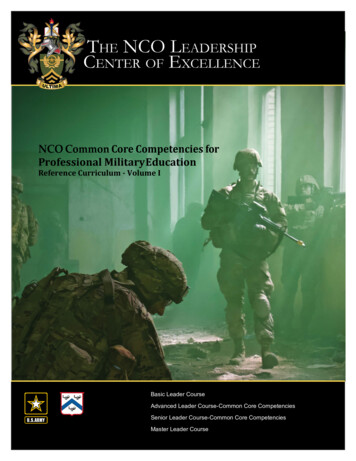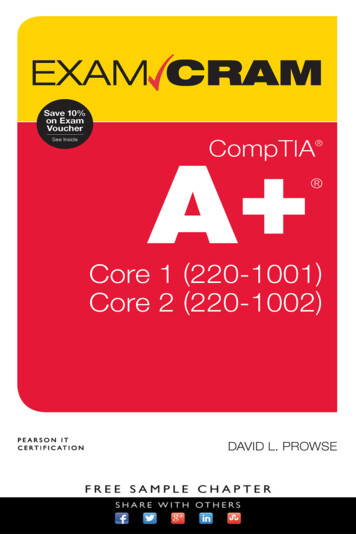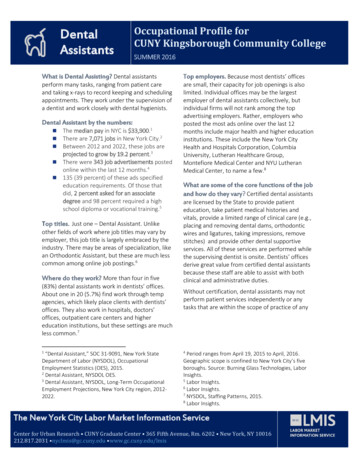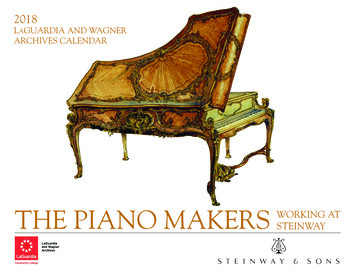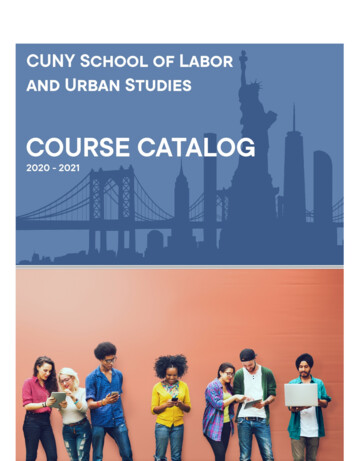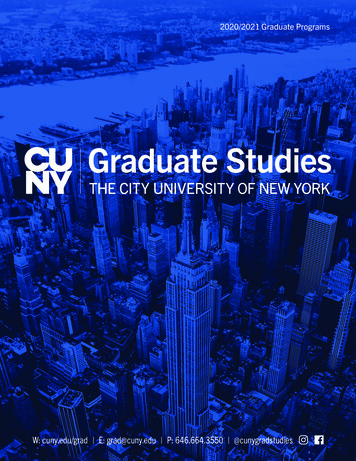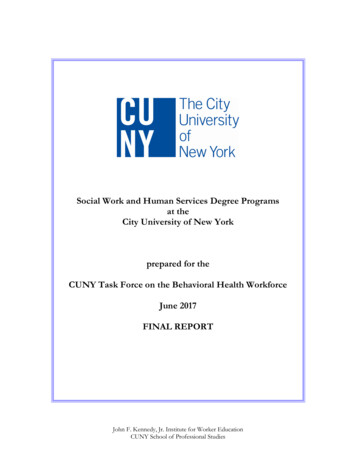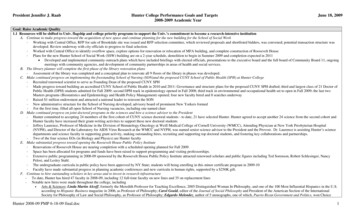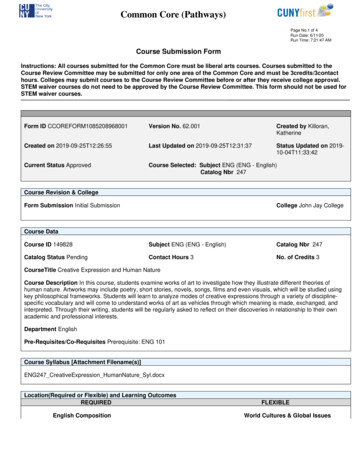
Transcription
Common Core (Pathways)Page No.1 of 4Run Date: 6/11/20Run Time: 7:21:47 AMCourse Submission FormInstructions: All courses submitted for the Common Core must be liberal arts courses. Courses submitted to theCourse Review Committee may be submitted for only one area of the Common Core and must be 3credits/3contacthours. Colleges may submit courses to the Course Review Committee before or after they receive college approval.STEM waiver courses do not need to be approved by the Course Review Committee. This form should not be used forSTEM waiver courses.Form ID CCOREFORM1085208968001Version No. 62.001Created by Killoran,KatherineCreated on 2019-09-25T12:26:55Last Updated on 2019-09-25T12:31:37Status Updated on 201910-04T11:33:42Current Status ApprovedCourse Selected: Subject ENG (ENG - English)Catalog Nbr 247Course Revision & CollegeForm Submission Initial SubmissionCollege John Jay CollegeCourse DataCourse ID 149828Subject ENG (ENG - English)Catalog Nbr 247Catalog Status PendingContact Hours 3No. of Credits 3CourseTitle Creative Expression and Human NatureCourse Description In this course, students examine works of art to investigate how they illustrate different theories ofhuman nature. Artworks may include poetry, short stories, novels, songs, films and even visuals, which will be studied usingkey philosophical frameworks. Students will learn to analyze modes of creative expressions through a variety of disciplinespecific vocabulary and will come to understand works of art as vehicles through which meaning is made, exchanged, andinterpreted. Through their writing, students will be regularly asked to reflect on their discoveries in relationship to their ownacademic and professional interests.Department EnglishPre-Requisites/Co-Requisites Prerequisite: ENG 101Course Syllabus [Attachment Filename(s)]ENG247 CreativeExpression HumanNature Syl.docxLocation(Required or Flexible) and Learning OutcomesREQUIREDEnglish CompositionFLEXIBLEWorld Cultures & Global Issues
Common Core (Pathways)Page No.2 of 4Run Date: 6/11/20Run Time: 7:21:47 AMMath & Quantitative ReasoningUS Experience in its DiversityLife and Physical SciencesCreative ExpressionIndividual and SocietyScientific WorldLearning Outcomes: QuestionsLearning Outcomes: Responses* 1. Gather, interpret, and assess information from avariety of sources and points of view.Students will gather multiple primary and secondary sources tocomplete the course's four major high-stakes writing projects:all three writing and research projects and the group projectassignment. (See sample syllabus.) For the last three (of four)formal projects listed on this sample syllabus, students willselect their own objects of study for their primary text argumentwork and will conduct secondary academic research on boththeir self-selected object/s of study as well as on the framingtheoretical lens they're applying to said object of study.Students will demonstrate the research they've gathered andtheir interpretations of it though reflective annotatedbibliography work as well as through the projects themselves.Most importantly, as a course organized by "ways of looking atthe world," the course is inherently designed (through itsreadings and low-stakes assignments) to encourage studentsto approach objects, scenes, and texts from multiple points ofview; we will do this together in class and students will alsodemonstrate their ability to do this work on their own throughprimary and secondary research. Weekly low-stakes writingassignments will require students to demonstrate the ability tolook at texts through various perspectives.* 2. Evaluate evidence and arguments critically oranalytically.Students will read a wide range of conflicting arguments abouthuman nature from perspectives such as the following:Freudian, existential, Judeo-Christian, Islamic, Marxist etc ineach unit, as marked on the syllabus, and will be asked tocritically interpret and analyze their central arguments.For all formal and informal assignments, students will be askedto explain, evaluate, and apply the tenets of each worldview toa variety of art objects in a variety of ways. While severalobjects of artistic study and perspectives on human nature willbe selected by the instructor, students will also be asked to pickanother not covered in the course and to present on it for theclass in groups. These projects require that studentsdemonstrate the ability to evaluate evidence and argumentscritically and analytically.
Common Core (Pathways)Page No.3 of 4Run Date: 6/11/20Run Time: 7:21:47 AM* 3. Produce well-reasoned written or oral argumentsusing evidence to support conclusions.All formal writing assignments require students to craft thesisdriven, self-designed arguments. In all formal writingassignments, students will be expected to work carefully withclaims, evidence, and warrant (taught carefully in pre-writingscaffolded homework assignments and reinforced in named,isolated parts on the grading rubrics) in order to carefullysupport their thesis.For their last two formal assignments, students will be asked toapply the human nature theory of their choice to a comparativeanalysis of two objects of artistic study of their choice and tocreate a well-supported argument that links them. Theseprojects will be entirely self-designed and will allow students todemonstrate well-reasoned written arguments through the useof evidence to support their conclusions.4. Identify and apply the fundamental concepts andmethods of a discipline or interdisciplinary fieldexploring creative expression, including, but notlimited to, arts, communications, creative writing,media arts, music, and theater.By applying psychological, philosophical, and socialtheories/frameworks to various forms of artistic expression(such as poetry, songs, scripts, short stories, TV shows, othervisual texts etc.) from a variety of periods/genres/cultures,students will learn to analyze and describe past andcontemporary cultural materials through a variety of disciplinespecific vocabulary.This work will show students that all the world?all of itsexpressions, laws, interpersonal situations, cultural materialsetc.?are texts, those which can and must be viewed from avariety of perspectives depending upon the people, cultures,and disciplines involved/applied.5. Analyze how arts from diverse cultures of the pastserve as a foundation for those of the present, anddescribe the significance of works of art in thesocieties that created them.6. Articulate how meaning is created in the arts orcommunications and how experience is interpretedand conveyed.By applying multiple human-nature theories to a variety ofcreative forms, students will learn to argue for multiple analysesof each text's significance depending upon the worldview ofboth the author and the audience. They will also learn to arguefor how form and genre play an explicit role in shapingmeaning.As part of their arguments about these texts, students willconduct primary and secondary research on their self-selectedobjects of artistic study.
Common Core (Pathways)Page No.4 of 4Run Date: 6/11/20Run Time: 7:21:47 AM7. Demonstrate knowledge of the skills involved in thecreative process.Through genre and form analysis (as the course will cover awide variety such as?but not necessarily limited to? shortstories, plays, TV shows, film excepts, poems, songs, visualtexts etc.) students will learn to identify and discuss craftelements implemented by the creators of these objects ofstudy. In their formal writing, students will be expected to useskill-vocabulary in order to articulate their analyses of eachpiece of creative expression.8. Use appropriate technologies to conduct researchand to communicate.Students will be required to use online academic databases formany of their formal writing assignments.All students' work will also be housed and reflected on in selfdesigned Digication eportfolios.A. If there is a change to the course title, what is thenew course title?B. If there is a change to the course description, whatis the new course description?C. If there is a change to the pre-requisites and/or corequisites, what are the new pre-requisites and/or corequisites?Chair (Approver) CommentsComments Course meets SLOs.
Creative Expression and Human NatureProfessor MadrazoWed. 11-1:30ENG 247Spring, 2018Course Description:In this course, students examine works of art to investigate how they illustrate differenttheories of human nature. Artworks may include poetry, short stories, novels, songs, filmsand even visuals, which will be studied using key philosophical frameworks. Students willlearn to analyze modes of creative expressions through a variety of discipline-specificvocabulary and will come to understand works of art as vehicles through which meaning ismade, exchanged, and interpreted. Through their writing, students will be regularly asked toreflect on their discoveries in relationship to their own academic and professional interests.Learning Objectives:Flexible Core: Gather, interpret, and assess information from a variety of sources and points of view. Evaluate evidence and arguments critically or analytically. Produce well-reasoned written or oral arguments using evidence to support conclusions.Creative Expressions: Articulate how meaning is created in the arts or communications and how experience isinterpreted and conveyed. Demonstrate knowledge of the skills involved in the creative process. Use appropriate technologies to conduct research and to communicate.Sophomore Signature: Articulate connections between course content or skills and individual academic andprofessional goals.Required Course Texts: Twelve Theories of Human Nature—Stevenson & Haberman 6th Edition(ISBN-13: 978-0199859030 ISBN-10: 0199859035) ORCourse packet designed by instructor
Literature: An Introduction to Fiction, Poetry, Drama, and Writing. 12th Edition (ISBN10: 0-205-23038-5 ISBN-13: 978-0-205-23038-9) No Exit and Three Other Plays by Jean Paul Sartre(ISBN-10: 0679725164)Formal Essays:English 2XX students will be held responsible for a wide variety of assignments including threeformally graded argument projects and one group presentation (see assignment sheets in Bb):1) A character analysis close-reading argument project (3-4 pp, primary texts as sourcesonly)2) A song/poetry argument project for which students will apply one human naturetheory to the text of their choice as part of their argument about their self-selectedobject of study (3-5 pp, primary text and theory text as sources required)3) A final comparative project for which students will connect two objects of study oftheir choice through the lens of one human nature theory they’ve not yet used in aformal writing assignment. (6-10 pp, primary lit and theory texts required; academicarticles on both the lit and theory texts required as secondary sources)** Group Project/Presentation: Each group assigned a human nature perspective we havenot yet covered; in groups, students will teach the perspective’s “diagnosis” and“prescription,” key vocabulary, and basic history. Groups will assign the class an in-classreading with the attempt to analyze it through the lens of the theory taught by the group.)Each of these assignments will incorporate primary text analysis (both in process and product)and each of these three essays will be built from a variety of smaller, scaffolded assignments—especially the final project, which will require a variety of different writing types and steps atdifferent points of the process.Specific models, instruction, group work, and preliminary writing steps will be devoted topreparing students for each phase of each writing project. Students will be held responsible forexplaining, analyzing, and reflecting on the prescribed steps that led to their “final” products inorder to improve knowledge transfer. In other words, students will reflect on how they built eachadvanced piece of writing in order to better apply some (or all) of these steps to future productfocused writing assignments—those with few pre-steps.Other assignments include readings, writing exercises, group work, response writing/homework,and preliminary writings including outlines, proposals, rough drafts, etc. Formal and informal
writing will be assigned very regularly.It is the student’s responsibility to remain aware of all assignments by staying up to date with thecourse outline. Please note that all students (present or not) are responsible for everything thathappens in class.Grading: 5% Reading Quizzes 10% Participation/Attendance 10% Low-Stakes Informal Writing/Reading Work(Incl: HW/Classwork/Scaffolded Project Steps) 10% Group Human Nature Presentation/Class Lesson 15% Character Analysis Project 20% Song/Poetry Analysis Project 30% Final Comparison Research ProjectParticipation:An extremely important component of the class is student participation. All students shouldcome to class prepared with assignments, appropriate texts, and notebooks and should be readyto participate with questions, comments, ideas, and opinions. Attendance points are part of theparticipation component of this course, because absence (full or partial) renders students unableto participate. (See Attendance Section.)Attendance:Given the nature of a discussion-based and/or workshop course, attendance is required. Allabsences will affect students’ final participation portion of the course. (See Grading Section.)***Questions concerning readings, assignments, discussions are always welcomed and arestrongly encouraged.Assignment Late Policy:Due to the nature of this fast-paced, weekly course, no homework or class workwill be accepted late unless specific arrangements have been made with theprofessor.Quizzes:Short unannounced reading quizzes will be given often throughout the semester. Quizzes aredesigned to assess students’ comprehension of the basic knowledge that should have beenattained upon completion of the homework. The reading quizzes are very easy; they’re simplydesigned to give credit to those who did the reading or any other kinds of homework that do not
require you to hand in work. All quizzes will be averaged at the completion of the semester withthe exception of the lowest grade. (Please note that missed quizzes cannot be made up. A missedquiz can, however, be used as your dropped score.Course Schedule:Notes: All assignments listed below are due on the day for which they’re listed. Unlessotherwise noted, students are responsible for each reading on the day marked. Most informal writing and homework are not marked on this schedule. Shortwriting/viewing assignments and homework will be assigned daily and posted in Bb. Week 1 [1/28]-Judeo-Christian Worldview (Chap 6)—Haberman and Stevenson-HW on theory’s “diagnosis” and “prescription” –See Bb"Rhetorical Criticism: Theory of Genres” –Frye-“Salvation” –Hughes-“The Lottery” –Jackson-“A Good Man is Hard to Find”—O’Connor Week 2 [2/4]-Islamic Worldview (Chap 7)—Haberman and Stevenson-HW on theory’s “diagnosis” and “prescription” –See Bb“Thinking the Everyday: Genre, Form, Fiction”—James-“Hamari Gali” –AliThe Kite Runner –Hosseini-Formal Essay 1 assigned in class Week 3 [2/11]-Psychoanalytic/Freudian Worldview (Chap 10)—Haberman and Stevenson-HW on theory’s “diagnosis” and “prescription” –See Bb"Genres, Text Types, or Discourse Modes? Narrative Modalities andGeneric Categorization." –Fludernik-“The Metamorphosis” –Kafka-“A Rose for Emily” –Faulkner-Formal Essay 1 project step due (see assignment)-Revised text homework due Week 4 [2/18]-“Rethinking Genre from a Sociocognitive Perspective” –Berkenkotter-Oedipus Rex—Sophocles-The Bluest Eye (excerpts in Bb)—Morrison-Formal Essay 1 draft due/ in-class workshop Week 5 [2/25]
-Existential Worldview (Chap 11)—Haberman and Stevenson-HW on theory’s “diagnosis” and “prescription” –See Bb-The Woman in the Dunes (excerpts) –Abe Kobo-“Mother” and “Death” chapters from Winesburg, Ohio—Anderson-Formal Essay 1 draft returned/workshop session on papers Week 6 [3/4]-No Exit—Sartre-Formal Essay 1 final draft due and Formal Essay 2 assigned-Selected Arrested Development excerpts reviewed in class-Hunger Games excerpts reviewed in class-In-Class Song Analysis workshop Week 7 [3/11]-Excerpts from The Color Purple –Walker-Neruda poetry –-selected works (See course packet)-Hughes poetry—selected works (See course packet)-Formal Essay 2 project step due/In-class workshop with lyrics//poetry (See assignment in Bb) Week 8 [3/18]-Marxist Worldview (Chap 9)—Haberman and Stevenson-HW on theory’s “diagnosis” and “prescription” –See Bb“Art Infusion in Retailing: The Effect of Art Genres”—Naletelich-“Eleven” –Cisneros-Death of a Salesman—Miller-Formal Essay 2 draft due in class/in-class workshop-Group worldview project assigned Week 9 [3/25] Week 10 [4/1]-Father Comes Home from the Wars (Part 1)—Parks-Formal Essay 3 project step due in class-Formal Project 2 draft returned-Group worldview project proposal due (draft 1)-Buddhism Worldview (Chap 3)—Haberman and Stevenson-HW on theory’s “diagnosis” and “prescription” –See Bb-“Style and Significance in Art History and Art Criticism” –Robinson-TRIP INFO TBA—RUBIN MUSEUM OF ART(See Bb for visual writing assignment)-Selected works TBA—Urthona Journal of Buddhism & the Arts-Formal Project 2 final draft due
-In-class article workshop with academic database articles Week 11 [4/15]-New Worldview (Student Group’s Choice)Group Project/Presentation week:Remaining human nature chapter of your group’s choice: ieTaoism, Kant, Darwin, HinduismSee assignment in Bb:Group Project/Presentation: Each group assigned a human natureperspective we have not yet covered; in groups, students will teachthe perspective’s core “diagnosis” and “prescription,” keyvocabulary, and basic history. Groups will assign the class a shortin-class reading and aim to lead the group through an analysis of itthrough the lens of that theory.)-First 2 pages of Formal Essay 3 rough draft due for in-class workshop/peer review homework Week 12 [4/22]-New Worldview Group Project/Presentations in class, continued-Formal Essay 3 rough draft due for instructor comments-In-class reflective writing workshop with drafts Week 13 [4/29]–Comparative Worldview Unit-Group Project/Presentations in class, remaining-Formal Essay 3 rough draft returned/in-class workshop Week 14 [5/6]–Comparative Worldview Unit-Hamlet—Shakespeare (Acts 1-3)-Analysis homework:Use of three disparate human nature theories--See Bb-Formal Essay 3 final draft due Week 15–Comparative Worldview Unit-Hamlet—Shakespeare (continued Acts 4-5)-Scene study with film version-Final paper returned/end of semester wrap-up(Please see John Jay’s online final exam schedule for more info)
Form Submission Initial Submission College John Jay College Course Data Course ID 149828 Subject ENG (ENG - English) Catalog Nbr 247 Catalog Status Pending Contact Hours 3 No. of Credits 3 . designed Digication eportfolios. A. If there is a change to the course title, what is the ne
